About the Harsh Truth Series
In life, you can’t control alot of things – this is the harshest truth about life. But there is one thing you can control and that is yourself and your reactions to the never ending challenges life will throw at you. The harsh truths is a bi-weekly interview showcasing the harshness embedded in different spheres of life and academics. Today’s edition focuses on the Medical Laboratory Scientist and Student.
The harsh Truth Series enables you embrace your own reality and realise that you alone can make you happy.
An Interview with Scientist Olayinka Gbenga about the harsh truths of being a Medical Laboratory Scientist and Student
Hanat: Can we get to meet you sir?
Scientist Gbenga: My name is Olayinka Gbenga. I am a 500 level student, Medical Laboratory Science (Chemical Pathology), Achievers University, Owo.
Hanat: Nice to meet you! What influenced your career choice?
Scientist Gbenga : After I finished my National Diploma in Science Laboratory Technology at Rufus Giwa Polytechnic, Owo. I was so lucky that I got a job as a Laboratory Attendant at Achievers University, where I was posted to the Department of Medical laboratory Science.
It was during this period (1year 3months) that I realised that there’s a big difference between SLT and MLS. I also got interested in Medical lab because I sometimes listen to their lectures and attend the 500L seminars. Then I decided to leave the job and further my studies in the field of Medical Laboratory Science. Afterwards I fell in love with Medical Laboratory Science.
Hanat: Wow, so cool! So, have you ever questioned your career choice? Why or why not?
Scientist Gbenga : As a Medical Laboratory Science Student, my answer is no, but I have once thought of Nursing because of the job opportunities availed to nurses outside of the country.
Why nursing?
Scientist Gbenga : Because it’s easier to leave Nigeria as a Nurse than as any other professional.
See: Medical Lab Science VS Nursing Science: Which is more lucrative?
Hanat: What are the major challenges you have faced so far?
Scientist Gbenga : To be frank, my major challenge is cramming, it seems impossible for me no matter how hard I try, and in Medical Laboratory, there are some courses that you just have to cram some of it’s sections. If I don’t understand, I won’t be able to remember what I’ve read.
Hanat: How did you overcome this challenge?
Scientist Gbenga: I meet friends to tell me how they memorized it, or I engage in discussion with my colleagues.
Was there ever a time you pierced yourself while getting a blood sample from a patient?
Scientist Gbenga: No. No way that is going to happen!
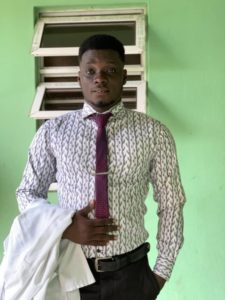
Hanat: Was there ever an emergency situation where you needed a PPE and it was unavailable?
Scientist Gbenga : I don’t think there’s any.
Hanat: You don’t think or you can’t recollect any?
Scientist Gbenga: I can’t recollect any.
Hanat: Was there ever a time you needed to take samples from someone with highly infectious blood borne disease? How did you react?
Scientist Gbenga : It doesn’t matter whose blood I am taking, as long as it isn’t my own blood, it is a must I use the right technique and the right personal protective equipment.
Hanat: Is the personal protective equipment always available?
Scientist Gbenga: Not always, but I always have my personal glove.
Hanat: That’s very thoughtful, I must say.
What is the most pressing issue in the Nigerian health sector and what impact does it have on your profession?
Scientist Gbenga : Unconducive laboratory, work overload and inadequate equipment.
What is your opinion on Universal health care?
Scientist Gbenga: Well, to me, the world is moving forward but I am not sure how or when Africa will catch up with the rest of the world. Although, we have improved, but we still have a lot to do.
Hanat: Was there ever a time a patient refused sample collection? How did you handle it?
Scientist Gbenga: Yes, some patients have niddle phobia, hence, to overcome this challenge, such patient would sit and observe other patients’ reaction as I collect their samples. After collecting samples from about five patients, the patient would have gained enough confidence.
But, most times, I simply tell the patient not to waste my time due to my workload. At the end of the day, all patients end up giving sample, they do not have any other choice.
Hanat: What would you consider the most difficult part of your career?
Scientist Gbenga: Combining work and family! Medical Lab (and other health departments) is so time consuming. I have a lot of senior colleagues who still go for call (night and weekend duties) even after 15yrs in service.
How do you maintain a good mental health?
Scientist Gbenga: By having fun when I can, having good friends I share my thoughts with and good food too. I can’t kill myself.
Hanat:The food part is important. Lol
Hanat: Can you describe the medical, ethical and societal issues surrounding abortion?
Scientist Gbenga: Medically, abortion may and may not be advised depending on the circumstances surrounding the pregnancy and that is where the ethics comes in. It is the responsibility of the patient to decide if she will be aborting or not, and she should not be tricked or pressured into it.
Society, religion and culture frowns at abortion but the same religion and culture discriminates against women that give birth out of wedlock. What should we do?
Hanat: What is your opinion on fake lab experiments result and how quack clinics discredit your works?
Scientist Gbenga : I am not pleased, but it is the role of the Medical Laboratory Council of Nigeria to ensure that quacks are eliminated in the profession.
And also, a doctor who sent a sample to someone who is not a certified Medical Laboratory Scientist should expect nothing but a wrong result.Quacks simply cannot give what they do not have.
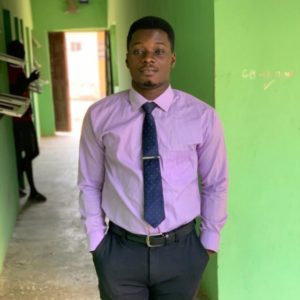
Hanat: They are not always easy to identify?
Scientist Gbenga: To know if your medical laboratory scientist is worthy and if you can rely on his result, a doctor should challenge the result once in a while. If he is good enough, then he will defend the result. A Medical Laboratory Scientist “must be able” to defend a test he did and signed out. We need the doctors to help eradicate this. And also, a proper awareness to the public on who a Certified Medical Laboratory Scientist really is.
What qualities do you feel are critical for a medical laboratory scientists and Why?
Scientist Gbenga : He must work with conscience and to keep in mind that every sample is a life and one day someone will run test on his own sample.
Hanat: Was there ever a time excessive sympathy with your patient interfered with your job?
Scientist Gbenga: None that I can remember.
Hanat: I’m sure everyone wants a story, please remember, sir.
Sientist Gbenga: I supported a patient with fund in getting blood for his mom, he had donated to the mother and she still needs blood and he doesn’t have enough on him. I felt his pain and helped out.
Hanat: Was it against school rules?
Scientist Gbenga : It’s not, but if I do that for everybody I have sympathy for, I would go broke in no time.
Hanat: A lot of people see medical laboratory scientists as assistant doctors, how would you define your position in the health sector while changing the stereotype?
Scientist Gbenga: Hmm…Medical Laboratory Science indeed started out as being assistant doctors but over the years, the profession has grown and it’s potential growth is immeasurable.
Modern Medical Laboratory Science it’s a special department in the hospital settings in which more than 70% of clinical decision is made from the laboratory result. The standard hospital cannot stand without a functioning Medical Laboratory.
What job opportunities are available as a graduate of medical laboratory science?
Scientist Gbenga: So many, but you have to be competent. A Medical Laboratory Scientist is not restricted to Medical Laboratory alone, they can work as a researcher, academics. The fact that Medical Laboratory Science has four major disciplines and provides more opportunities.
Hanat: What are the disciplines?
Scientist Gbenga: The Specialties or disciplines are;
- Medical Microbiology
- Chemical Pathology
- Histopathology
- Haematology
Hanat: Any advice to young medical laboratory science students?
Scientist Gbenga : Focus on your studies, meet friends and senior colleagues to put your through. There’s a bright future in Medical Laboratory Science but you have to be very good to maximize the potential.
Hanat: Thank you sir for granting us audience.
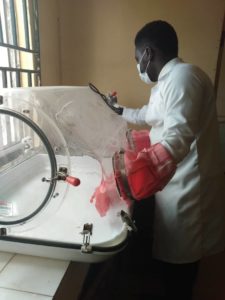
Interviewer: Olalere Hanat Asake
Lagos State University, Nigeria
Olalere Hanat Asake is a medical student at Lagos state University. She’s passionate about Gender based violence and feminism. Her hobbies include writing, sleeping and eating .

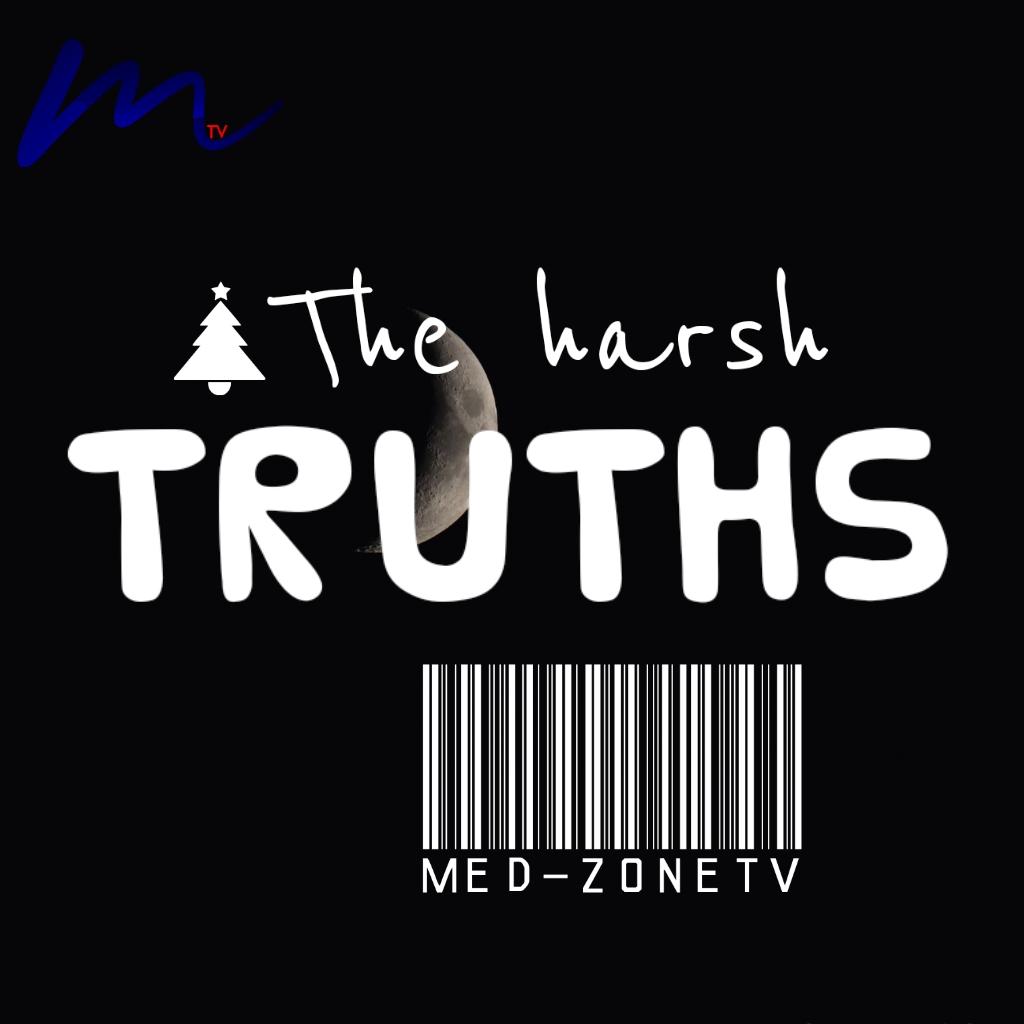
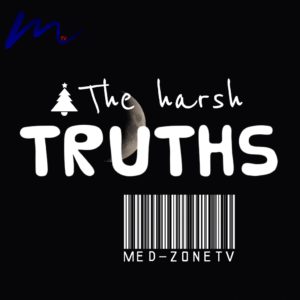
this is wow….. I felt in love with the profession…. please my question is that what is the meaning of PPE and do they have a special office for all medical laboratory scientist and also is it true that some University are trying to implore something that they will be tagging MLScientists as a doctor i.e Doctor in Medical laboratory science and is their different between MLT and MLS
Thanks sir
PPE means personal protective equipment.
MLT and MLS do not mean the same thing.
Many people are confused by the terms ‘medical lab technician’ and ‘medical lab scientist’, and often think these refer to the same thing. While individuals employed in either of these occupations can work in the same settings and have similar responsibilities, there are also many inherent differences.
In addition to Hanat’s response, Medical Lab Technician is a 3-year certificate course offered in Colleges of Health Science and Technology, while a Medical Lab Scientist is a university graduate.
Epic! ✨
This is nice.
Well done
Thank you very much
Even as an Accounting student, I enjoyed this session and learnt some new things. Kudos to the team!! And please let’s have more of this in coming weeks or days.
PS: I would love to know more about the four specialities mentioned in the interview.
I’ll like to talk about fake medical results though It’s not always the fault of the scientist. I’m an MLS, so I know
Sometime, when these doctors or nurses take samples, they take the samples wrongly
Sometimes they collect blood into a bottle that has no anti coagulant
Sample would have clotted before reaching lab
Or sometimes when there’s anti coagulant, they move the sample so much it lyses before reaching the lab
Making accurate result impossible
Maybe you’re right. Nevertheless, it is the job of the MLScientist to critically examine samples for clots, lyses etc to determine it’s suitability. And he has every right to reject non-suitable or inadequate samples with formal notification rather than churning out inaccurate results.
@Cocowriteze There is a breach in communication in which ego is the major factor..
There’s nothing bad if doctors and Medical Laboratory Scientist have an Inter-departmental seminals once in a while in the hospitals.
With this, all error arising from sample collection will be eradicated..
Appropriate sample collection is a first step towards having the right result..
When the foundation is not solid, the building is not useful..
In the laboratory, a qualified and well trained scientist should be able to identify by result correlation (not most of the times if the sample is appropriately collected or not.
Medical laboratory is beyond running test on samples..
And that is why I always say that even if machines are coming up, you still need a competent scientist to give you the right result
What’s the difference between
a Medical Laboratory Scientist and Science Laboratory Technologist who studied a 5-year University programme?
At my Institution, students study the SLT degree programme for a period of 5-years. What differentiates individuals from both specialities?
@kimberly
I finished my National Diploma in Science Laboratory Technology (SLT) year 2013, now I am in my 5th year in Medical Laboratory Science (MLS) and I can tell you categorically that there’s a big difference between SLT and MLS.
MLS has its basis in basic medical sciences (Anatomy, physiology, biochemistry and microbiology) while SLT has basis is basic sciences (Physics, chemistry and biology).
You may ask what this means; it means a science laboratory Technologist won’t know anything about blood physiology, cardiovascular, embryology etc. And throughout my stay in school, I was never taught how to collect a blood sample. This is Part of basic training for a year 2 MLS student. All these knowledge makes a medical laboratory Scientist different and useful in the medical laboratory because they have studied different normal and abnormal conditions, the test to do, how to do the test, what your result should look like and how to correlate the result with the clinical condition of the patient.
another difference is in SLT you get to specialise in either pure Microbiology, environmental biology, physics with electronics, industrial chemistry etc.
These are the laboratories in which a graduate of SLT can work but in MLS you have the 4 major discipline (chemical pathology, haematology, medical microbiology and Histopathology) and those are the 4 major Department in a medical laboratory.
I can remember (as an SLT national diploma graduate) I once asked my boss (who is a Medical lab scientist) to explained what PCV means to me..
He just smiled and told me to write jamb and do MLS.
I came to realised in year 2 that PCV is one of the basic and simple test and even if he explained, I still wouldn’t have understood because I didn’t even know what plasma means, I didn’t know the factors that could affect my result or what centrifugal force means..
MLS is very difficult from SLT..
The curriculum and training says it all
Where do an Slt student a degree if 5yrs course works and isn’t there MLS in university
So true,😪😪
A student of it,tho”
…won’t forget to comment “you gat good composition. Kudos😁
There is no harsh truth here, was expecting cons of being a medlab Students, the heading of the article made me opened it, the article name doesn’t fit the interview questions, this should rather be “Everyday life of a medical lab scientist” instead of using “Harsh truth” harsh should be related to cons goodus
Thanks for the enlightenment…can you pls enlighten me more on MLS disciplines I mean the likes of chemical pathology,medical microbiology etc…will be glad sir…cos you will sure save a soul from going astray
Chemical Pathology (also clinical chemistry) applies the knowledge and principles of Biochemistry, physiology and chemistry in analysing samples either for research or diagnostic purpose. You talk about liver function, renal , git function etc (make more research.
Haematology studies blood cell and blood products; from blood formation to it grave, it also covers all blood pathology and diagnosis. It also include serology, blood transfusion science.
Histopathology: the study of all human tissue in normal and in abnormal condition (including all forms of malignancy), laboratory processing of tissues and stains..
Medical Microbiology: study of all microbs of Medical importance, treatment and diagnosis, drug testing and also include public health microbiology.
In all the above, you must study, pathopysilogy, the type of sample to obtain (to include when, how and in what container to obtain the samples)
You must know the symptoms and why.
You must know all the variables that can affect your result as well as the control.
You must know the principle of the test and know when the result do not deviates from the clinical presentation.
I hope I Just saved a soul.
MLS has four disciplines majorly
1. Hematology and BGS
2. Chemical Pathology
3. Medical Microbiology
4. Histopathology and Cytology
Hematology and BGS as the name implies has is divided into two
The Hematology Part deals with medical complications of the blood cells either from their origin (stem cell), population (Full blood count, Pack cell volume, WBC count, etc), abnormal shape, etc
While the BGS (Blood Group Serology) deals with the study of blood transfusion, compatibility tests (X-matching) between donor and recipient , immunological reaction that can arise, blood groups, Transfusion Transmitted infections (TTI)…etc
Medical Microbiology
It’s just the study of microorganisms that are of medical importance.
They are divided into 4
Bacteriology (study of bacterias)
Virology (study of viruses)
Mycology (study of fungi)
Parasitology (study of parasites)
Chemical pathology
In simple words, it’s just the study of the body chemistry
Ranging from breakdown of macro nutrients ( CHO, protein and fat/oil), micro nutrients, trace elements, vitamins….
Also here we study the enzymes involved in this breakdown, medical complications that can arise from this breakdown…
We also study various physiology of the organs in the body as relating to the chemistry they produce and various complications that arise including the hormones, enzymes, receptor, etc they produce
Well, if we were to divide chem path…I would say we have,
Immunology
Enzymology
Hormonal Study
Nutrition (Lipid, CHO and Protein)
Organ Function study( where we have LFT and RFT)
Finally,
Histopathology and Cytology
Histopathology is the study of tissue and their related disease conditions
While cytology is the study of cells in the body and disease conditions relating to them
MLS is a broad course, like so complex, preclinical and clinical levels, if we are to talk about specialty that’s in final year, chemicals pathology, medical microbiology, haematology, histopathology/morbid anatomy as well as forensic and some others specialty in overseas.
Chemical pathology is a branch of MLS that’s deals with the use of biochemical laboratory tests to diagnose disease and to manage patients it can also be called clinical chemistry, medical biochemistry etc, while medical microbiology is also concerned with the diagnosis, treatment and prevention of infectious diseases e.g virus, bacteria,fungi, parasite these are also in sub unit of medical microbiology in the cases of virology, mycology,parasitology, bacteriology, while heamatology studies the morphology of blood and blood-forming tissues. It covers the cellular composition of blood, blood cell formation, haemoglobin synthesis and all related disorders e.g hemoglobinopathies so histopathology is the diagnosis and study of diseases of the tissues,it can also be called morbid anatomy, cytopathology.
Thanks